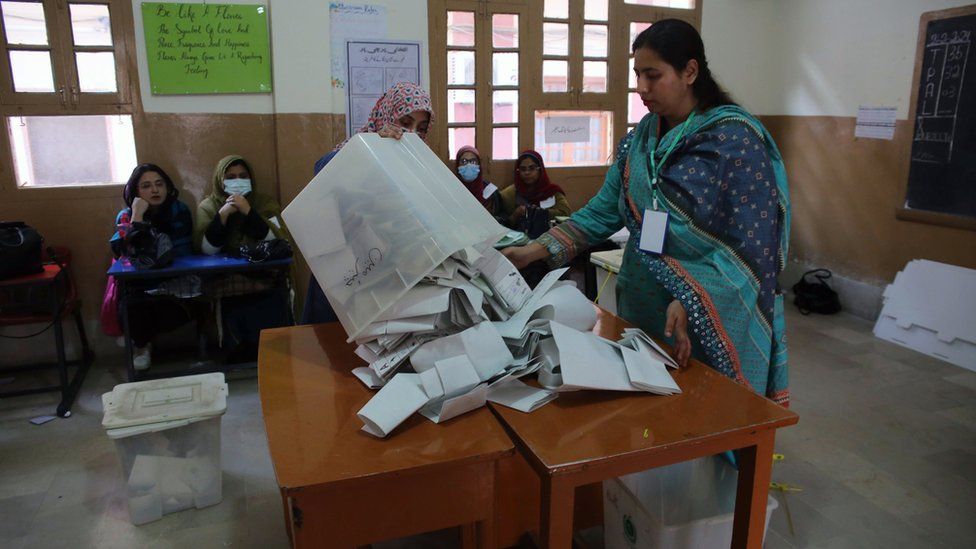-

-
-
Loading

Loading

Votes are currently being counted in Pakistan following Thursday's general election, which was marred by the suspension of mobile phone services and violent unrest. The results have been slow to emerge, leading election officials to urge local officials to speed up the process. The party of disqualified and imprisoned former Prime Minister Imran Khan has accused the delay of being a sign of vote-rigging. Khan's supporters are challenging the party of another former Prime Minister, Nawaz Sharif. Many analysts have criticized this election as one of Pakistan's least credible. Khan, who was ousted two years ago and replaced by Sharif's brother Shehbaz as prime minister, was barred from standing in this election due to corruption charges. His party, Pakistan Tehreek-e-Insaf (PTI), criticized the suspension of internet services, calling it a "cowardly act" that hindered voters in finding their polling stations. The government cited attacks aimed at disrupting the vote as the reason for the suspension of services. Communication networks were shut down just 10 minutes before voting commenced, although wifi networks appeared to still be functional. Some voters expressed shock at the decision, stating that voters should be facilitated instead of facing obstacles. Others were disappointed that they could not use the internet to book taxis to go and vote or communicate with family members to coordinate their trips to the polling stations. While isolated incidents of violence occurred on election day, including bomb attacks on police officials and candidates' offices, Pakistan did not experience large-scale militant attacks. The internet shutdown was condemned by Bilawal Bhutto Zardari, the son of assassinated former Prime Minister Benazir Bhutto and the leader of the Pakistan People's Party (PPP), who called for services to be restored immediately. The country has previously employed internet shutdowns to control the flow of information, but the extent of the shutdown during an election was unprecedented. The election registered around 128 million voters, with nearly half of them under the age of 35. The National Assembly, comprised of 336 members, had 266 directly elected seats contested by over 5,000 candidates, of which only 313 were women. Khan's PTI faced difficulty in identifying its candidates due to its ban from using the cricket bat symbol under which they traditionally run. This forced PTI-backed candidates to use alternative symbols such as calculators and electric heaters. The PTI alleged that further tactics were employed to prevent their candidates from campaigning, including imprisoning and banning PTI members and supporters from holding rallies. Imran Khan, currently serving a 14-year prison sentence, has accused Pakistan's powerful military of interference. On the other hand, voters were able to support Nawaz Sharif, the PML-N leader who served a sentence for corruption during the last election. Sharif, who had previously been ousted in a military coup, returned from exile and had his lifetime ban on holding office overturned, allowing him to stand for an unprecedented fourth term. The country is facing economic challenges, with soaring inflation and increased violence. The Center for Research and Security Studies (CRSS) reported that violent incidents in Pakistan have risen for the third consecutive year, resulting in the highest number of recorded fatalities since 2017, including security forces, militants, and civilians.